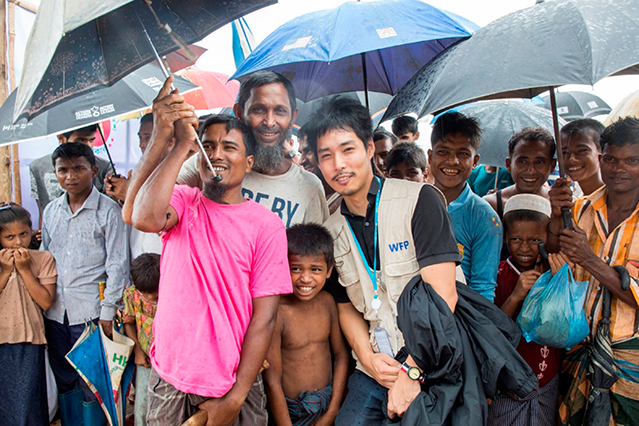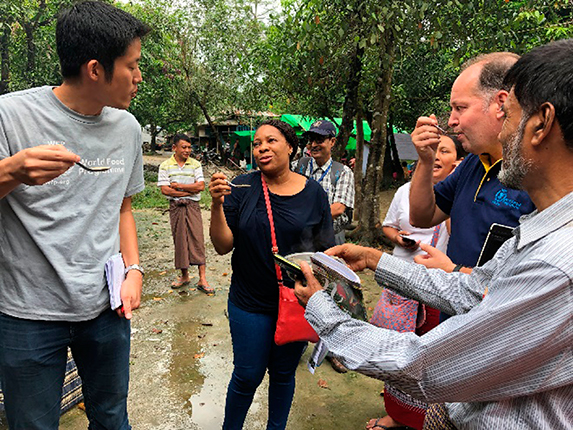Stories from the Field 3
Voices of Young Japanese Personnel Working in International Organizations Committed to Humanitarian Support in Asia
– From the Frontlines of Bangladesh and Myanmar
Bangladesh
In August 2017, a fierce conflict broke out in the north of Rakhine State in Myanmar, leading to more than 720,000 people fleeing to neighboring Bangladesh. The population in the camp for the displaced persons in Cox’s Bazar suddenly leaped from the pre-conflict figures of several hundreds of thousands to more than 1 million, making it the largest and most densely populated camp in the world. When such urgent humanitarian crises arise, the UN World Food Programme (WFP) dispatches many specialist staff members from around the world to cope with the emergency. In July 2018, one year after the crisis, I also went to the frontline in Bangladesh from the Headquarters in Rome, and worked there for two months.

With the beneficiaries of a disaster-prevention project supported by Japan in the camp for displaced persons in Cox’s Bazar (August 2018)
During the period of my appointment, the local situation remained unchanged, where large-scale support was still required for the displaced persons. Thus, in addition to food assistance for approximately 900,000 people, we carried out a project to improve nutrition among pregnant women and children under the age of five, who were in a state of acute malnutrition. At present, WFP is making efforts particularly to provide assistance through the distribution of electronic food cards (hereinafter, cards) to the displaced persons, transferring an appropriate amount of money according to the situation of each household, and enabling them to purchase the food they need from designated shops. The cards are also distributed to the females in families, in order to leave what they buy to their own discretion, so that women are encouraged to live their lives. WFP has also introduced a digital platform system to manage biometric registration such as fingerprints, as well as household information that are vital to provide the assistance. This system also benefits activities of other organizations that provide non-food items.
Moreover, a mechanism for aid coordination and logistics (flow of goods and its management) is indispensable during humanitarian crisis when a number of humanitarian partners are in place to provide assistance. In such places, WFP plays a leading role in the fields of physical distribution, communication, and development of a basic infrastructural environment, and has also been active in the camp for displaced persons in Cox’s Bazar.
Furthermore, assistance to promote self-reliance of displaced persons and ensure their human dignity is essential while many of them do not yet have a means to earn a living, in addition to avoiding food shortages and malnutrition through support such as provision of school lunches for children. In order to realize this type of support, I am in charge of the analysis of household surveys related to the food insufficiency, nutritional condition, the degree of poverty, and other diverse needs among the displaced persons. Based on these analyses, WFP is providing the displaced persons with assistance, which can serve as a medium to long-term “prescription.”
While assistance to displaced persons has been delivered from the international community including the Government of Japan, WFP is also pursuing efforts to maximize the efficiency of assistance and promote Japan’s “visible assistance” in collaboration with the Japanese private sector, such as food assistance to displaced persons through production support for small-scale farmers in the host community.
“How can we reduce the number of people suffering from food shortage while that of refugees and displaced persons increases day by day due to conflicts and natural disasters?” My answer to this question is to connect humanitarian assistance and assistance that can encourage people’s self-reliance. I have been involved in projects in the Middle East and Sudan as a UN Volunteer*1 and JPO (Junior Professional Officer)*2 for five years, since I joined WFP through the “Program for Global Human Resource Development for Peacebuilding and Development” of the Ministry of Foreign Affairs (see here for details). Going forward, I will strive to propose the most suitable assistance, so as to link humanitarian assistance and assistance for self-reliance even more effectively.
Takahiro Utsumi, Food Security Analysis Officer
United Nations World Food Programme (UN WFP)
Rome Headquarters
*1 Personnel dispatched under the UN Volunteer Programme (UNV) created by a UN General Assembly resolution in 1970 as an organization under the UN Development Programme (UNDP), active in the field of development such as health and medical care, and agricultural development in developing countries.
*2 Personnel dispatched under a system (the Junior Professional Officer Programme) for young Japanese nationals who aspire to work in international organizations as regular staff, wherein they work as personnel in various international organizations for a fixed period of time (two years in principle), with the expense of their dispatch covered by the Japanese Government.
Myanmar
For approximately two months immediately after the incident in August 2017, humanitarian assistance organizations including WFP, except for the International Committee of the Red Cross (ICRC), were not permitted to implement activities in the north of Rakhine State. Meanwhile, it was an urgent matter for WFP to propose a plan for a swift response to resume its activities. At the time, as a member of the team responsible for emergency assistance, I was carrying out tasks such as gathering field information, which was changing day by day, and sequentially making reports to our Headquarters in Rome. Myanmar was in a tense situation, although it was completely different from that of Bangladesh where large-scale emergency food assistance was required.
In November 2017, WFP became the first international organization to obtain permission for its activities in the north of Rakhine State after the incident, and until the present, has continued to provide emergency food assistance to several tens of thousands of people every month (approximately 100,000 people since July 2018). As of December 2018, WFP is the organization with the largest number of beneficiaries. WFP has been able to continue these activities by the generous support of Japan and other donors. Currently, I am engaged in tasks such as providing support to our regional offices occupied with emergency response, coordinating assistance projects, and reporting the progress of our projects to donors and other actors.

Participating in emergency food assistance and nutritional support in Maungdaw, located in the north of Rakhine State (October 2018)
In addition to emergency assistance, WFP has gradually resumed its work to encourage the self-reliance of local communities in the north of Rakhine State with a long term perspective. Since March 2018, we have been implementing a cash for work program to build small-scale infrastructure, and promoting support for the revitalization of the local economy, while ensuring food security by utilizing the infrastructure. Our project in Rakhine State includes places where different ethnic groups are mixed, and it plays a role in restoring those relationships based on trust among these groups which deteriorated after the incident.
In addition, we are working on distributing school lunches to around 20,000 students of approximately 140 schools located in the north of Rakhine State. Provision of school lunches motivates children to go to school and increases their concentration during classes. Children are the future of the country. WFP is making efforts in developing this system of school lunches to improve the educational environment. WFP is also providing nutritional support in Rakhine State for pregnant women and children under the age of five, who are the most prone to being affected by food shortage.
In July, August, and October 2018, I had opportunities to visit the north of Rakhine State to monitor the situation. When I saw the places which had used to prosper and turned out to be a wasteland as far as the eye could see at present, I felt a deep pain in my heart. However, when visiting villages and observing the provision of food, I feel that we are giving people hope, even if only a little. I believe that WFP is providing effective and meaningful food assistance in various countries and under diverse situations, and I have never felt as proud to be a WFP member as I did when engaged in emergency assistance.
A major reason why I first became interested in WFP is that I was struck by its simple mission to eliminate hunger, and its tangible activity of providing food assistance. Approximately five years have passed since I joined WFP, but even now, this is my motivation. Currently, I am learning every day how to implement humanitarian and development assistance effectively, and wish to contribute to the “eradication of hunger” in my own way. Going forward, I hope to accumulate further experience in the field offices, where actual food assistance is being carried out.
Fumitsugu Tosu, Programme Policy Officer
United Nations World Food Programme (UN WFP)
Myanmar Office
<< Previous Page Next Page >>
Main Text | Reference Statistics | Stories from the Field | Master Techniques from Japan to the World | ODA Topics
